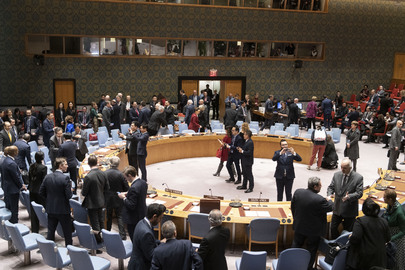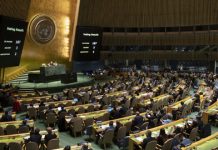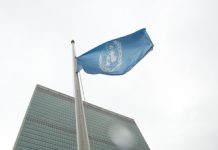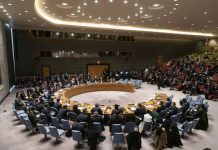This is UN News Today with me, Conor Lennon. The headlines:
The UN climate chief says action to end the crisis is still too slow, but it’s moving in the right direction…
Widespread killings and indiscriminate violence has been reported by refugees fleeing El Fasher in Sudan…
AND…
The Taliban’s 48-hour communication blackout in Afghanistan violated human rights, the UN says.
‘Step change’ in national climate commitments
This year has seen a ‘step change’ in the commitments made by countries to tackle the climate crisis, but it needs to happen faster.
Simon Stiell, the head of UN climate change, made the comments in response to the launch of new report, released on Tuesday, detailing new national climate commitments, the progress being made, and the major challenges still remaining.
If the promises made by the nations of the world are met, global emissions could fall by about 10 per cent by 2035, said Mr. Stiell, although action needs to be accelerated to prevent further warming.
The UN climate chief added that the private sector is also moving in the right direction.
CLIP
The opportunities in climate action are monumental. The rewards for those taking strong climate actions are measured in millions of new jobs and trillions in new investment. As the global shift to clean energy continues to scale, the dividends to follow will be far greater still, as climate action emerges as the economic growth and jobs engine of the 21st century.
Mr. Stiell went on to call for policies and plans to ensure that every country benefits from clean energy and climate resilience.
Sudan: After El Fasher’s fall, civilians share harrowing stories of survival
Civilians fleeing killings and violence in the Sudanese city of El Fasher have been sharing their harrowing stories with aid workers from the UN refugee agency, UNHCR.
Briefing journalists on Tuesday, UNHCR spokesperson Jacqueline Wilma Parlevliet said that there has been a breakdown in communications with those still in the city, but newly arrived refugees have talked of widespread ethnically and politically motivated killings and indiscriminate violence.
CLIP
We have accounts of people with disabilities who were killed as they were unable to flee, but we also hear people that are trying to leave the city and manage to get out the city, but on the way they are caught up and they are also being shot.
Media reports indicate that the Rapid Support Forces militia have taken control of El Fasher from Government forces, triggering widespread fear among families who lived through 500 days of relentless siege and conflict.
An estimated 26,000 people have left the key city in recent days, and additional displacement has been reported across the North Darfur region, with more expected to flee in the coming days and weeks.
Internet blackout in Afghanistan was major human rights violation
The 48-hour telecommunications blackout imposed by the de facto authorities in Afghanistan had “serious and far-reaching human rights impacts,” the UN rights office revealed on Tuesday.
The shutdown, between 29 September and 1 October, led to delays in access to healthcare and emergency services, disrupted humanitarian services and worsened conditions for women and girls, who already live under draconian restrictions.
The rights office declared that disproportionate restrictions on communications violate the rights to freedom of expression and access to information, and are contrary to Afghanistan’s human rights obligations.
Conor Lennon, UN News.
Source of original article: United Nations (news.un.org). Photo credit: UN. The content of this article does not necessarily reflect the views or opinion of Global Diaspora News (www.globaldiasporanews.com).
To submit your press release: (https://www.globaldiasporanews.com/pr).
To advertise on Global Diaspora News: (www.globaldiasporanews.com/ads).
Sign up to Global Diaspora News newsletter (https://www.globaldiasporanews.com/newsletter/) to start receiving updates and opportunities directly in your email inbox for free.





























